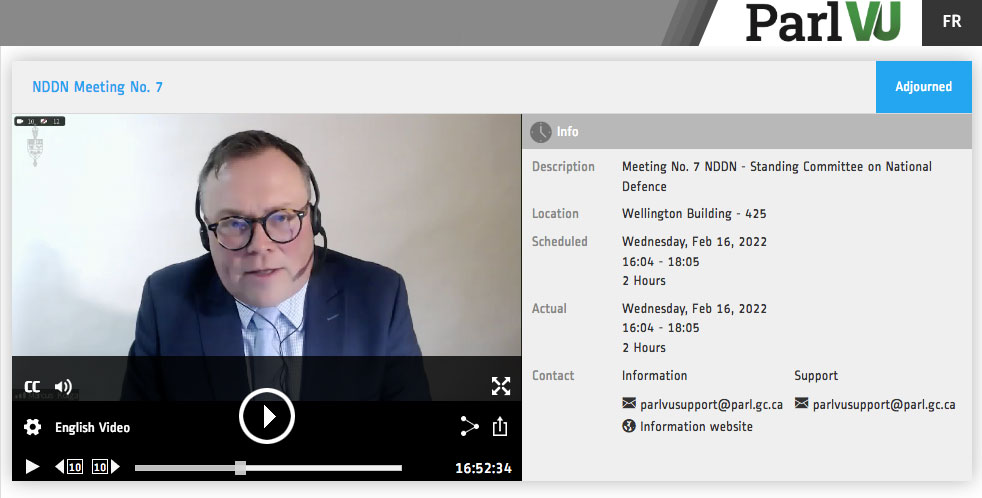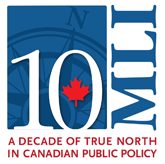
DisinfoWatch Director Marcus Kolga appearing before the Parliamentary Standing Committee on National Defence on February 16, 2022.
Marcus Kolga’s prepared remarks on the threat of Russian government information warfare to Canada’s democracy, delivered at the Parliamentary Standing Committee on National Defence on February 16, 2022:
Mr. Chairman, members of the committee:
Thank you for inviting me to speak with you today about the threat posed by foreign influence and information operations to our security and our democracy.
In addition to being a senior fellow at the Macdonald-Laurier AND CDA institutes, I’m the director of DisinfoWatch, a platform that is dedicated to monitoring and exposing foreign information warfare targeting Canada and our allies; and to help Canadians develop the cognitive resources that allow them to recognize and reject disinformation and influence operations.
As has been repeatedly noted by Canada’s intelligence community and The National Security and Intelligence Committee of Parliament, the threat of foreign information warfare and influence operations, known more broadly as cognitive warfare, is persistent and growing.
Canada is a significant target for Chinese, Russian and Iranian actors who seek to manipulate our media, elected officials, civil society, armed forces, ethnic communities and Canadian interests with information operations.
During the 2022 federal election, DisinfoWatch first alerted Canadians to a coordinated Chinese government aligned influence operation that included disinformation on Chinese state media platforms. The Atlantic Council’s DFRLab and researchers from McGill University later published similar findings.
Since early 2020, we have observed Russian state media, and its proxies here in Canada, trying to polarize our society by promoting narratives that take advantage of public fear, anger and confusion that have grown during the COVID pandemic.
I would like to stress, that the Kremlin does not share any ideology or values with any major Canadian political party. Vladimir Putin’s only ideology is corruption and power. As such, our democratic values represent an existential threat to his regime, which is why targets us. Vladimir Putin can only compete with democratic nations that are divided, and when our defensive alliances, like NATO, are broken.
To achieve this, Russian state actors, operating in the shadows of the extreme political left and right, seek to divide our society by eroding our bonds within it.
In the United States we have witnessed state actors exploit civil unrest, environmental issues and other sensitive political issues.
In Canada, we recently observed Russian state media exploit COVID protests by promoting extremists voices who seek the overthrow of our democratically elected government.
Our armed forces serving in Latvia and Ukraine have also been targeted by Russian information warfare.
In efforts to subvert the trust of Russian speakers in Latvia towards Canada’s NATO mission and troops, Russian state media published an outrageously false report about it in 2017. The news report featured photographs of a former Canadian officer and convicted killer, Russell Williams, wearing women’s underwear, falsely claiming that he was leading a gay Canadian army to convert Latvians into homosexuals.
In order to remain in power, Vladimir Putin needs his people to believe that Russia is in a constant state of conflict and crisis, with enemies all around it. And that only he can protect his people against them.
This is one important reason, why he has created the current crisis on Ukraine’s and NATO’s borders.
Vladimir Putin is seeking to gaslight Ukrainians, Canadians and the western world, to believe that NATO and our friends in Ukraine have caused the crisis that he has manufactured.
He wants everyone to believe that NATO has encircled Russia and that nations like Ukraine, Estonia, Latvia and Lithuania, and yes, even Canada, pose a threat to Russia’s sovereignty.
The Russian government also wants us to believe that Ukraine isn’t worth defending. That’s why Russian state media promotes disinformation about Ukraine’s government being controlled by neo-Nazis, when it is actually led by a democratically elected government, whose president is a member of the Jewish-Ukrainian community.
A 2019 Russian state media report even accused the Ukrainian Canadian community of controlling our foreign policy – a conspiracy theory narrative that is directly intended to delegitimize the voice of this community and discriminate against them. We’ve seen this tactic before with other minority communities.
Cognitive warfare – disinformation and influence operations – along with cyber, is the primary battlefield of 21st century warfare. Our government and our armed forces must be equipped with resources to defend against this growing menace that threatens our security and our democracy.
Canada should take the immediate step of placing economic sanctions on Russian and Chinese state broadcasters to limit their ability to pollute our information environment and profit from it.
Finally, the Canadian government’s understanding of cognitive warfare, must develop beyond one that focuses primarily on elections and social media. As many of us, including our intelligence community, have repeatedly warned over the past few years, this threat is persistent and growing. We must start taking cognitive warfare seriously and we should begin by creating a task force to learn from our allies and develop capabilities and resources to defend our democracy against it.

